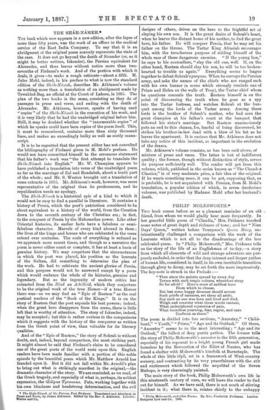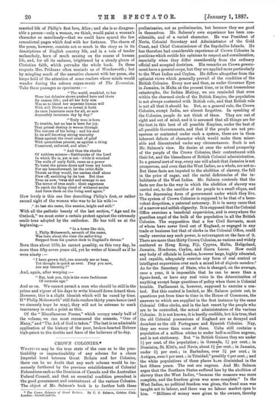PHILIP MOLESWORTH.*
Tam book comes before us as a pleasant reminder of an okt friend, from whom we would gladly hear more frequently. In her graceful little poem of "Claudia," Mrs. Prideaux touched some notes of great depth and richness of tone ; and her " Nine Days' Queen," written before Tennyson's Queen Mary, un-
intentionally challenged a comparison with the work of the Laureate which is not all to the disadvantage of the less celebrated poem. In "Philip Molesworth," Mrs. Prideaux tells us the story of the life of an Englishman of to-day,—a story from which all elements of wild and strange adventure are pur- posely excluded, in order that the deep interest and deeper pathos of human life, considered in itself, in its own inevitable transition through glory to decay, may be set forth the more impressively. The key-note is struck in the Prelude :—
" Then since the palette spread by every day
Teems with such tragic colours, wherefore stray So far afield ? Here's store of saddest hues From which to choose.
But lest some happy dreamer should accuse Such griefs of rareness, set them all aside, Say such an one was born and lived and died, Weigh and consider what these words contain, What undeciphered mysteries of pain, What boundless yearning, fear, regret, and care Confront us there."
The poem is divided into five sections, "Ancestry," " Child- hood," " Youth," " Prime," " Age and its Outlook." Of these, "Ancestry " seems to us the most interesting ; " Age and its Outlook," the fullest of deep poetic pathos. The former tells the story of Philip Moles worth's ancestor in the fifth generation, especially of his espousal to a bright young French girl made homeless by the Revocation of the Edict of Nantes, who has found a shelter with Molesworth's kinsfolk at Barnstaple. The whole of this little idyll, set in a framework of West-country scenery, and contrasting by its very peacefulness with the stir and excitement which followed the acquittal of the Seven Bishops, is very charmingly painted.
The main story of the book, Philip Molesworth's own life in this nineteenth century of ours, we will leave the reader to find out for himself. As we have said, there is not much of stirring incident in it ; what there is, relates chiefly to the unhappy • Philip Molestoorth, and other Poems. By Mrs. Frederick Prideanx. London Sampson Low and Co. 1885. married life of Philip's first love, Alice ; and she is so disagree- able a person—only a woman, we think, would paint a woman's character so mercilessly—that we could have spared the few sensational pages which deal with her fortunes. The charm of the poem, however, consists not so much in the story as in its descriptions of English country life, and in a vein of tender melancholy, born of much musing on the course of human life, and, for all its sadness, brightened by a _steady gleam of Christian faith, which pervades the whole book. In these respects Mrs. Prideaux often reminds us of Wordsworth ; but by mingling much of the narrative element with her poem, she keeps hold of the attention of some readers whose minds would wander during the solemn organ-music of The Excursion. Take these passages as specimens :— " The world, mankind, to her
Were but delusive shows pushed here and there By unseen life ; and all her holy aim Was so to blend her separate human will With will Divine as to reveal it forth Aa once Incarnate once for all, so now Accessibly incarnate day by day."
"Truly man is born To trouble, but no less is born for joy. That primal destiny is woven through The texture of his being : and his soul In its self-knowing strong maturity Rises against the cruel crash of grief With quenchless protest, as against a thing Unnatural, enforced, and alien."
" And thus the shocks Of ruthless science—Earthquake of the Lord In which He is, yet is not—while it wrecked The walls of early faith, came as a power To burst the prison-doors and loose my bonds. For me henceforward, let the critic-flails Thresh as they would, the useless chaff alone Flew off, enriching by its loss. But then Even as now, 'twas sad and strange to see The terror of true souls : their eagerness To catch the flying cloud of withered scales And force them on the living seed again."
How lovely is this one line describing Philip's first, or rather second sight of the woman who was to be his wife !—
." At last she oame, like sunrise, bright and still."
With all the pathetic beauty of the last section, "Age and its Outlook," we must enter a certain protest against the extremely senile tone adopted by the ontlooker. He has told us at the beginning,—
" In a home like this,
I, Philip Moleswortb, seventh of the name, Was born about the time the sailor-king Stepped from his quarter-deck to England's throne."
Born thus about 1830, he cannot possibly, on this very day, be more than fifty-seven years old, yet he writes of himself as if he were ninety :—
" I have grown dull, can scarcely see or hear, Yet thought is quick as ever. Pray you now, Are any listening ?"
And, again, after weeping :-
" But, look you, this is the mere feebleness Of extreme age."
And so on. We cannot permit a man who should be still in the prime and vigour of his days to write himself down dotard thus. However, this is a slight blemish which will be cured by time. If "Philip Moles worth" still finds readers thirty years hence (and we sincerely hope he may), they will not be extreme to mark inaccuracy in such a point as this.
Of the "Miscellaneous Poems," which occupy nearly half of the volume, we can most recommend the sonnets, "One of Many," and "The Ark of God is taken." The last is an admirable application of the history of the poor, broken-hearted Hebrew high-priest to the doubts and fears of the believers of to-day.















































 Previous page
Previous page